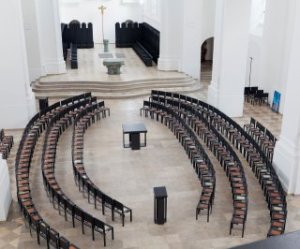"The Miracle of the Mass" Chapel of St. Martin, Assisi
Transcendental Affirmation par excellence
Transcendental Affirmation par excellence
The English philosopher Roger Scruton (b 1944 AD) has noted that modern totalitarian societies are founded on "transcendental negation." Marxists practice dialectical materialism, so they specifically exclude the transcendent, but all modern societies, (including our own) are marked to some degree by this same affliction. Its bleak materiality is one reason for the deep dissatisfactions of modern society, and explains why modern society contains so much ugliness. The modern church, too, practices its own type of transcendental negation, as evidenced by, among other things, the "wreckovations" carried out in so many parishes since the 1960s, and the growing blight of concrete cube churches. Few things say "transcendental negation" louder and clearer than a concrete cube church.
And yet we are not driven to despair, since, as Scruton points out, the way to renew modern societies is very simple. All we need to do is live the religious life, which involves seeking for the living God. I suspect many of you are already doing this. However, Scruton suggests that this work involves in addition the preservation of our memory of the spiritual way of life, and of the things which contain this memory. The Dogmatic Constitution on Divine Revelation Dei Verbum (1965 AD) said much the same thing when it declared "...what was handed on by the Apostles includes everything which contributes toward the holiness of life and increase in faith of the peoples of God; and so the Church, in her teaching, life and worship, perpetuates and hands on to all generations all that she herself is, all that she believes " (emphasis mine) Among such containers of spiritual memory are the sacred music from the old Mass. That is why the suppression and concealment of that music (and that sublime ceremony), which the Church ought instead to be perpetuating and handing on, is so tragic.
Here is the the full quotation from Scruton:
I agree with you that the high [European] culture in which I have always put my trust has been effectively destroyed by its own appointed guardians, and that without the religious core it persists only as a fragile shell. . . . But this [renewal] means, as you say, rejecting the premise of modern life, that God is dead, and starting all over again, seeking for the living God, and hoping to be visited by his grace. If people are prepared to live the religious life, then their example will once again make this course available to the mass of mankind, and there will be hope. At the same time, we must constantly fight those who are trying to destroy the memory of the spiritual way of life, and assailing all those things in which that memory is contained. In particular we should exercise our aesthetic choices in art devoted to the ideals of beauty and order, and refrain from the kind of desecration that has become the norm in modern art schools. (Dominicana 55.2 [Winter 2012], 65
h/t New Liturgical Movement
RELATED: Even



No comments:
Post a Comment